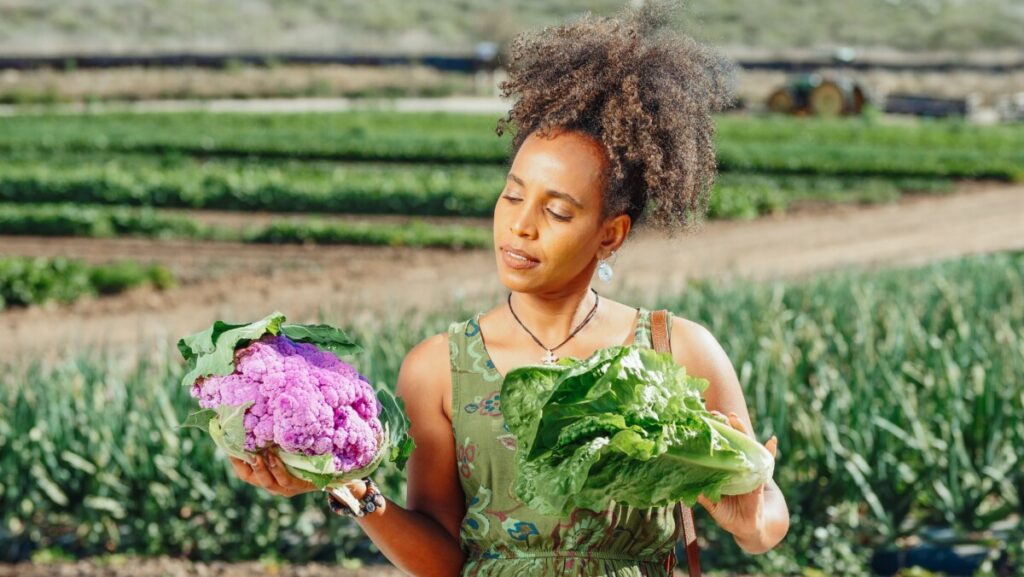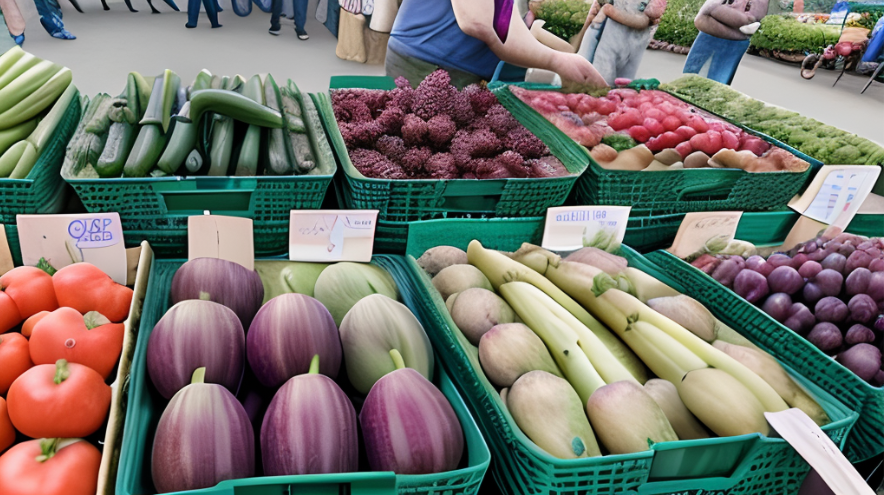Effective Organic Farming Techniques

Welcome to the world of organic farming! If you’re looking to cultivate a sustainable and eco-friendly approach to farming, you’ve come to the right place. In this blog, we’ll explore a variety of effective organic farming techniques that can help you grow healthy, nutrient-rich produce while promoting environmental wellness. Whether you’re a seasoned farmer or just starting, we’ve got tips and insights to help you thrive in the world of organic agriculture. So, grab your gardening gloves, and let’s dig into the wonderful world of organic farming!
What is Organic Farming?
Organic farming is a system for crops that emphasizes environmental protection and the use of natural farming techniques. It is a holistic approach that considers the entire system used to produce and deliver agricultural products. Organic methods avoid the use of synthetic pesticides, fertilizers, and genetically modified organisms (GMOs), focusing instead on sustainable practices that enhance soil health and biodiversity.
Benefits of Organic Farming
Proponents of organic farming believe that it offers several benefits compared to conventional farming methods.
These include:
Environmental Sustainability: Organic farming practices promote soil health, water conservation, and biodiversity preservation. By avoiding the use of synthetic chemicals, organic farmers reduce the risk of pollution and minimize their impact on ecosystems.
Healthier Food: Organic farming involves the use of natural fertilizers and pest control methods, which can result in food that is free from harmful residues. Organic produce is also often richer in nutrients and antioxidants, contributing to better overall health and well-being.
Improved Soil Quality: Organic farmers prioritize soil fertility through the use of compost, cover crops, and crop rotation. These practices help improve soil structure, enhance nutrient availability, and promote beneficial microbial activity, leading to more resilient and productive farmland.
Reduced Greenhouse Gas Emissions: Organic farming methods, such as avoiding synthetic fertilizers and using organic matter to improve soil health, can help mitigate climate change by reducing greenhouse gas emissions.
Support for Local Economies: Organic farming typically involves smaller-scale operations, which can contribute to the sustainability and resilience of local communities. By supporting local farmers, consumers help stimulate the local economy and reduce reliance on imported goods.
Remember, organic farming is an agricultural approach that places a strong emphasis on environmental protection and sustainable practices. By promoting soil health, biodiversity, and the production of healthier food, organic farming offers several benefits to both the environment and human well-being. [1][2][3][4]
Organic Farming Principles
Minimize Soil Disturbance
Organic farming advocates for minimizing soil disturbance to preserve soil health. This can be achieved through practices such as reduced tillage and utilizing no-till farming methods. By minimizing soil disturbance, organic farmers prevent soil erosion, maintain soil structure, and promote beneficial microbial activity.
Cover Cropping for Soil Health
Cover cropping is a crucial practice in organic farming for boosting soil health. It involves planting cover crops like rye, clovers, vetches, and radishes during non-growing periods of the main crop. These cover crops play a vital role in preventing erosion, enhancing soil structure through organic matter addition, and improving nutrient availability. As a result, the soil becomes healthier and more productive.
Composting in Organic Farming
Importance of Composting
– Composting is a crucial component of organic farming as it helps transform organic residues into a nutrient-rich humus-like material.
– Mature compost is biologically stable, free of unpleasant odors, and easier to handle compared to raw organic wastes.
– Compost improves soil structure, increases water retention, and enhances nutrient availability, leading to healthier and more productive crops.
How to Make Organic Compost
– Start by collecting organic materials such as kitchen scraps, yard waste, and livestock manure.
– Layer the materials in a compost bin or pile, alternating between green materials (high in nitrogen) and brown materials (high in carbon).
– Keep the compost moist and turn it periodically to ensure proper aeration and decomposition.
– The composting process can take several months to a year, depending on factors such as temperature and moisture levels.
– Once the compost is dark, crumbly, and earthy-smelling, it is ready to be used as a soil amendment in organic farming. [9][10][11][12]
Organic Pest and Weed Management
Ecologically Based Pest Controls
– Implementing ecologically based pest management strategies is essential in organic farming.
– This involves selecting and growing a diverse range of crops that are healthy and have natural defenses against pests.
– By planting different crops together, you can create a natural balance that reduces the risk of pest infestations.
Natural Weed Management Techniques
– Organic farmers rely on a variety of natural weed management techniques to control weed growth.
– This includes practices such as crop rotation, cover cropping, and mechanical cultivation.
– Crop rotation helps break weed cycles by interrupting their life cycle and depriving them of their preferred growing environment.
– Cover cropping involves planting non-cash crops to suppress weed growth and improve soil health.
– Mechanical cultivation, such as hand-weeding or using equipment like flame weeders, helps remove weeds without the use of chemicals. [13][14][15][16]
Organic Fertilizers and Nutrient Management
Biological Fertilizers for Soil Health
– Organic farming utilizes biological fertilizers such as manure compost and biofertilizers to supply nutrients to the soil.
– These organic materials help maintain soil organic matter, which is essential for soil health and fertility.
– By using biological fertilizers, organic farmers can promote beneficial microbial activity in the soil, improving nutrient availability for plants.
Crop Nutrition in Organic Farming
– Organic farmers focus on maintaining crop nutrition through sustainable practices.
– They grow cover crops to cycle soil nutrients and improve nutrient availability.
– Cover crops also can biologically fix atmospheric nitrogen, reducing the need for synthetic nitrogen fertilizers.
– Through these nutrient management practices, organic farming aims to ensure healthy and nutritious crops while promoting sustainable soil health. [17][18][19][20]
Organic Certification
Understanding Organic Certifications
– Organic certification ensures that farmers and businesses meet strict standards for the growing, processing, and handling of their products.
– The USDA organic seal indicates that a product is certified organic and contains 95 percent or more organic content.
– Certification is granted by private entities accredited by the USDA, located both in the United States and abroad.
– Certifying agents conduct on-site inspections to ensure compliance with organic standards.
Meeting Organic Standards
– Organic farming emphasizes natural processes and the use of organic materials for fertilization.
– Biological fertilizers, such as manure compost and biofertilizers, are used to supply nutrients to the soil.
– Cover crops are grown to cycle soil nutrients and improve nutrient availability, reducing the need for synthetic fertilizers.
– These practices aim to maintain soil health, promote beneficial microbial activity, and ensure healthy and nutritious crops.
Organic Farming Techniques
Crop Rotation and Diversification
– Organic farming systems emphasize the use of diverse crop rotations to maintain soil health and control pests and diseases.
– Longer crop rotations help break pest cycles and reduce the reliance on synthetic pesticides.
– Diversified farming systems also promote habitat for beneficial insects and improve overall ecosystem health.
Intercropping and Polyculture
– Intercropping involves growing different crops together in the same field, which can result in better weed and disease management.
– Polyculture refers to growing multiple crops together in a mixed planting pattern, which enhances biodiversity and promotes natural pest control.
– These methods mimic natural ecosystems and help reduce the need for chemical inputs in agriculture.
Organic Livestock Farming
Organic Animal Raising Methods
– Animals have year-round access to the outdoors, allowing them to graze on marginal land not suitable for crops.
– Organic livestock management emphasizes pasture-based systems, promoting biodiversity and humane treatment of animals.
– Antibiotics and hormones are not used in organic livestock production, reducing the risk of antibiotic resistance and superbugs.
– Animal waste is used as a tool for fertilizing the soil, improving its quality and nutrient content.
– Livestock assist with weed management by consuming or trampling unwanted plants.
Benefits of Organic Livestock Products
– Pasture-based products like eggs and milk from organic livestock have higher nutritional quality, containing more omega-3s and fatty acids.
– The soil benefits from organic livestock farming as it is fertilized naturally with animal manure.
– Eliminating the use of antibiotics in organic production reduces the risk of antibiotic resistance and the development of superbugs.
– Organic livestock contribute to weed management by consuming unwanted plants, reducing the need for herbicides.
– Grazing livestock on marginal land helps make use of resources that are not suitable for growing crops.
Organic Livestock Farming
Organic Animal Raising Methods
– Livestock assist with weed management by consuming or trampling unwanted plants.
– Organic livestock management emphasizes pasture-based systems, promoting biodiversity and humane treatment of animals.
– Animals have year-round access to the outdoors, allowing them to graze on marginal land not suitable for crops.
– Antibiotics and hormones are not used in organic livestock production, reducing the risk of antibiotic resistance and superbugs.
– Animal waste is used as a tool for fertilizing the soil, improving its quality and nutrient content.
Benefits of Organic Livestock Products
– Pasture-based products like eggs and milk from organic livestock have higher nutritional quality, containing more omega-3s and fatty acids.
– The soil benefits from organic livestock farming as it is fertilized naturally with animal manure.
– Eliminating the use of antibiotics in organic production reduces the risk of antibiotic resistance and the development of superbugs.
– Grazing livestock on marginal land helps make use of resources that are not suitable for growing crops.
– Organic livestock contribute to weed management by consuming unwanted plants, reducing the need for herbicides.
Conclusion
The Future of Organic Farming
– As environmental problems and health concerns continue to rise, organic farming is becoming more than just a trend, but a necessary part of agriculture.
– Organic agriculture is seen as a component of a green economy, promoting sustainability and natural processes.
– The prospects for organic farming in a Spanish Mediterranean region depend on the implementation of public policies to protect organic farmers and stimulate the consumption of organic products.
Potential Challenges and Ways to Overcome Them
– Lack of public policies aimed at protecting organic farmers and boosting consumption of organic products may limit the expansion of organic farming.
– To overcome this, governments should develop supportive policies and incentives for organic farmers and promote awareness among consumers about the benefits of organic products.
– Collaboration between organic farmers, researchers, and policymakers is crucial to address challenges and ensure a sustainable future for organic farming.
https://holisticwellnesswave.com/index.php/2024/02/06/reducing-food-waste-practical-tips-for-everyday-life/
FAQ’s
Q: What is organic agriculture?
A: Organic agriculture refers to a farming system that avoids the use of synthetic chemicals, such as pesticides and fertilizers, and instead relies on natural processes to maintain soil fertility and control pests.
Q: What is the National Organic Program?
A: The National Organic Program (NOP) is a regulatory program that is responsible for developing national standards for organically produced agricultural products. It is administered by the United States Department of Agriculture.
Q: What are some common farming practices in organic agriculture?
A: Common farming practices in organic agriculture include crop rotation, use of cover crops, natural pest control methods, and the avoidance of synthetic chemicals and genetically modified organisms (GMOs).
Q: How are organic farming methods different from conventional agriculture?
A: Organic farming methods focus on preserving soil health, biodiversity, and natural ecosystems, while conventional agriculture often relies on synthetic chemicals and genetically modified organisms to maximize yields.








